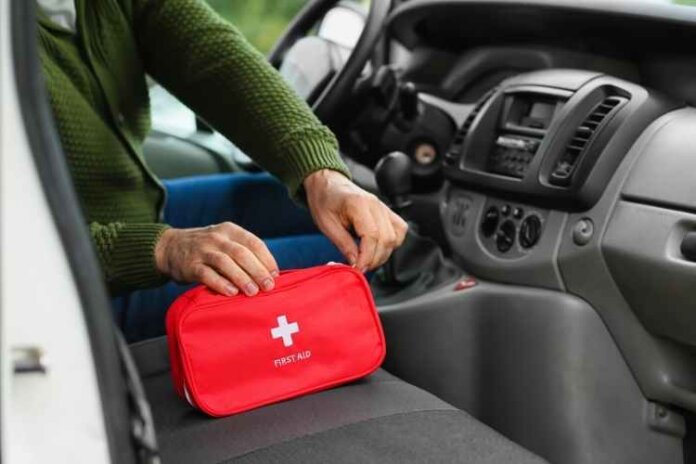
Intro:
In case your travel plans go sideways, it’s good to have provisions in your vehicle. Whether you own the car or have rented it, keep some essentials in it.
For example, gym members keep their bags in the vehicle at all times. They never know when they can fit in a quick, unscheduled workout session. Also, the bag ensures that they have an extra change of clothes in the vehicle, just in case.
Another set of essentials all drivers should keep in their vehicle is first aid-related.
Weekend warriors benefit from having the provisions handy in case they develop blisters while hiking or scrape their legs while jogging.
Every vehicle first aid kit benefits from including medical tape. The versatile essential provides a short-term solution for gashes, scrapes, and cuts.
We outline nine essential first aid items to always have in your car.
1. Bandages
Bandages serve several purposes. They help cover open wounds, stop bleeding, and keep a cut from becoming larger. Plus, they protect wounds against the elements and germs.
Bandage types that drivers can store in their vehicles include:
- Gauze
- Adhesive
- Compression
- Tube
Most members of the medical community encourage the public to keep gauze bandages in their first aid kits. Then, add the other types as necessary. Gauze provides the most versatility.
For weekend and road warriors, it’s worth adding specialized bandage options that cater to your adventuring needs.
2. Antibiotic Ointment
Even the most innocent cut and scrape can turn into an infected wound. Antibiotic ointment cleans up the impacted area. The ointment also treats it.
You’ll find a few variations of the topical solution in the aisles of your favorite retailer. Some relieve itching and others prevent scarring.
Vehicle collisions can lead to major scrapes and cuts that require infection prevention.
If you find yourself in a vehicle casualty, remember to contact a car accident attorney promptly.
3. Aspirin
A headache can happen at any time. Headache causes include:
- Stress
- A blow to the head
- Alcohol abuse
- Medications
It’s never ideal to experience a headache while driving. The task requires a driver’s full attention. Even mild headaches can distract drivers.
For a short-term solution, keep aspirin in your vehicle’s first aid kit. Your favorite brand can provide relief within half an hour.
4. Disposable Gloves
If you must treat an open wound on the road, disposable gloves prevent the spread of germs.
Disposable gloves come in handy for other situations too. You might need to look under your vehicle’s hood, a messy endeavor. The gloves keep a person’s hands clean.
If you need to pick up dirty stuff, slip them on.
For more protection, add reusable, heavy duty-gloves to your vehicle’s first aid kit.
5. Instant Cold Compress
An instant cold compress provides a short-term solution for the discomfort caused by mosquito bites, swelling, and injuries.
The simple first aid item consists of two components, water and ammonium nitrate. When you break the bags, the two components combine and deliver the cold compress.
It’s an important short-term solution to apply after a blow to the head.
6. Scissors
Sometimes it’s more economical to purchase tube bandages. Plus, the tube takes up less space. Thus, your first aid kit requires a set of scissors.
If someone in the group including the driver requires makeshift stitches, you need the scissors to cut the string.
For extra good measure, pack a set of tweezers too.
7. Tape
The medical tape helps keep everything together including the skin. Hikers who develop blisters benefit from wrapping their feet with the tape.
Moreover, in case of a vehicle collision, the tape keeps gauze in place en route to the emergency room.
8. Thermometer
Sometimes you need a medical device to confirm your temperature. When you need to decipher if you have a fever or not, a thermometer is the most accurate.
For the car, it’s OK to opt for simple, digital thermometers.
9. Water
Water doubles as a first-aid item in a pinch. It helps wash off blood, dirt, and germs.
Every vehicle owner should keep a case of bottled water in the trunk.
Conclusion
Driving remains a privilege and it carries a set of responsibilities. Responsible vehicle owners keep a makeshift first aid kit in their vehicles. You might have to tend to yourself after a rigorous outdoor or act as a good citizen and help others on the road. Plus, it provides peace of mind.











